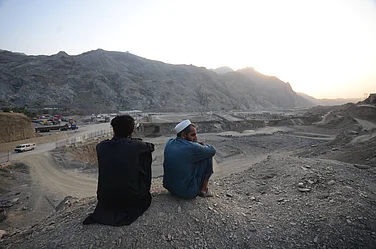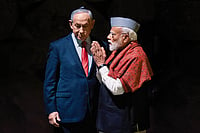“There is no God but Allah and Muhammad is His Messenger.” This belief is at the core of Islam, and Muslims view any criticism of the Prophet as sacrilege. The Islamic world is divided on several doctrinal and political issues—there are also various sects of Islam, though Sunnis and Shias are the two most important. Followers of both perceive any negative reference of the Prophet and his immediate family members as blasphemy. There have been countless examples of protests and fatwas on this count. Countries that have political differences and do not see an eye to eye on many issues, come together when it comes to any derogatory remarks against the Prophet.
It is not surprising then, that the BJP’s former national spokeswoman Nupur Sharma’s remarks evoked strong reactions in Muslim-majority countries, especially in the Gulf. It began with Qatar and Kuwait and spread across the Gulf in countries like Saudi Arabia, Oman, Jordan, UAE, as well as in Shia Iran, with official protests registered with the Indian envoys in these countries. Other important Sunni Muslim countries like Malaysia and Indonesia also reacted, along with Afghanistan, Pakistan and Maldives. Bangladesh was the one exception and preferred to keep quiet. What has to be noted is that the Gulf Cooperation Council (GCC) members are considered friendly to India and have excellent economic and political relations with PM Modi’s government. Ironically, the PM himself has invested time and energy to improve these relations. India’s reaction to these international complaints was to immediately expel Nupur Sharma as the BJP’s national spokesperson.
No Muslim ruler worth his salt can afford to keep quiet when the Prophet is denounced. The Gulf countries, which have in the past not reacted to disturbing news from India like vigilante killings in the name of cow protection, “love jihad” or the removal of Kashmir’s special status in 2019, used the Organisation of Islamic Cooperation (OIC) platform—of which all Gulf nations are members—to do so, bypassing any bilateral response.
One explanation for this apparent anomaly in their reactions is that these kingdoms do not get involved in the domestic politics of other countries. Detractors claim this is because their own human rights records are abysmal. For example, despite Pakistan’s effort to mobilise the Islamic world over the treatment of Kashmiris, as well as the general state of Indian Muslims, the Gulf nations kept mum and instead worked to cement their political and economic ties with Modi’s India.

But the slur on the Prophet was another matter. So, does this mean they are going to sever ties with India? Unlikely. Iran, which regards itself as the standard bearer of Shia Muslims of the world, did not cancel the visit of foreign minister Hossein Amir-Abdollahian. He was the first major leader of an Islamic country to visit India after the fracas. At the end of his three-day India trip, the foreign minister said that the two countries agreed on respecting all religions.
There have been several more serious incidents in the past. The most famous was the fatwa (religious decree) issued by Iran’s Ayatollah Khomeini in 1989 against British-Indian author Salman Rushdie for his novel The Satanic Verses. The allegorical novel, published in the UK in 1988, was regarded by many Muslims as an insult to the Prophet. Fresh on the back of the 1978 Iranian revolution, the Ayatollah saw it as an opportunity to project himself as the leader of the Islamic world. So it was natural for himto issue a fatwa, ordering believers to kill the author for insulting the Prophet.
As a result, Rushdie went into hiding. The British government spent millions of pounds providing round-the-clock security to the novelist for over a decade.
Protests against the publication of The Satanic Verses were held across the world, including in India. The book was banned in India and all Islamic countries.
Meanwhile, notoriety propelled the sale of The Satanic Verses, which is otherwise not considered among Rushdie’s best works. The author, who was well-known for his contributions to Indo-Anglican literature, became known worldwide thanks to the Iranian fatwa. Critics say he had deliberately courted controversy in his novel, with an eye on sales. Rushdie became a celebrity, with people continuing to show interest in every aspect of his life, including, years down the line, his relationship with the Indian-American television host, author and one-time model Padma Lakshmi. The fatwa remained in place, but the order to kill was withdrawn in 1998, when moderate leader Mohammad Khatami took over as President in Iran. Rushdie is a free man today, as the death threat is no longer valid.

A very different case is that of Salman Taseer, the erstwhile governor of Pakistan’s Punjab province. A senior politician of the Pakistan People’s Party, he was shot dead by his bodyguard on January 4, 2011, for supporting Asiya Bibi, a Christian who had been imprisoned and convicted on charge of blasphemy. The governor met the woman after she was convicted by a Pakistani court, held a press conference to denounce the judgment and announced that he would appeal to then president Zardari for her pardon. Enraged at his compassion for Asia Bibi, his security guard could not contain his rage and fired 28 times upon him from close range, killing Taseer.
The assassin, Mumtaz Qadri, was hailed as a hero by a large number of Pakistanis, who thought the insult to the Prophet should be avenged. After he was hanged for the assassination in 2016, his funeral was attended by thousands of religious Pakistanis.
Then on April 2017, Mashal Khan, a university student in Peshawar, was beaten to death by 10 others on campus, following allegations of sharing blasphemous content on social media. Such killings happen in many remote, tribal areas of Afghanistan and Pakistan, as well as in African nations, often on baseless charges of blasphemy that get little or no national or even international attention.
In Europe, the blasphemy debate revolves around the question of freedom of speech and right to self-expression. Free speech advocates are not bothered that for Muslims, representations of the Prophet are sacrilege. In the name of freedom of expression, Danish cartoonist Kurt Westergaard made a series of 12 cartoons for the conservative newspaper Jyllands-Posten in 2005. The caricatures were published with the headline The Face of Mohammed.
The most offending of the cartoons was one that showed the Prophet wearing a turban in the shape of a bomb. The newspaper possibly wished to make the point that Islam’s restrictions on reproducing the image of the Prophet did not apply to the non-Muslim world, especially Denmark.
But the moment the caricatures appeared, anger spilled out to the streets across the Muslim world. Many Muslims believed the cartoons were deliberately provocative and insensitive to Islam. People came out in towns and cities across the world in angry protests. Danish embassies became a target worldwide. Death threats were issued and the cartoonist had to go into hiding, with the government offering him security. But years later, till his death in 2021, Westergaard kept saying he did not regret what he had done, as it was part of Danish culture and he had the freedom to express himself. In 2008, after the arrest of three men involved in a plot to murder the cartoonist, Denmark’s three main newspapers reprinted the cartoon. The impact of the cartoons continued to simmer across the Islamic world.
Then in 2015, the Charlie Hebdo incident in France shook the world and fanned Islamophobia across Europe. Charlie Hebdo is a French satirical magazine known for taking digs at political leaders, the Catholic Church and State institutions. In 2012, it published cartoons of the Prophet. France has a large Muslim population and protests once again shook both France and Muslim nations. France was temporarily forced to close missions in 20 countries worldwide in the face of angry demonstrations.
Three years later, two French Muslims brothers decided to take matters into their own hands. On January 7, 2015, at a time when all senior editors of Charlie Hebdo had gathered for their morning meeting, they burst into the room with machine guns and killed 12 senior staffers, leaving at least 11 others injured. The gunmen claimed to be members of Al Qaeda in the Arabian peninsula. Later, both were shot dead by French Police.
But the reverberations did not die down. As late as 2020, French school teacher Samuel Paty was killed for showing a cartoon of the Prophet while teaching his class about freedom of speech. The beheading of Paty in a suburb of Paris led to national and international outrage. President Emmanuel Macron led the mourning for the slain school teacher and said free speech is sacrosanct to the French Republic.
Should there be a limit to free speech? No, according to free speech advocates. But can religious sentiments be set aside? Opinion remains divided. This is much like one man’s freedom fighter being considered a terrorist by another, or the chicken and egg conundrum. The world has not yet come to grips with this.
(This appeared in the print edition as "A History of Blasphemy")



























